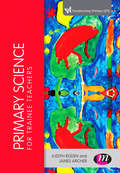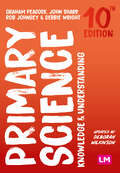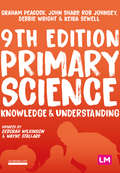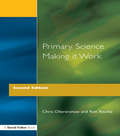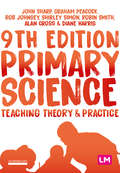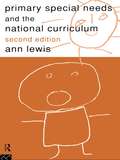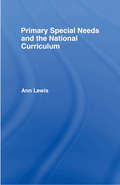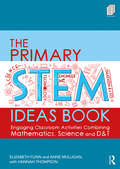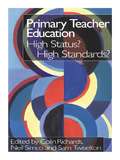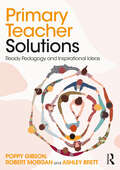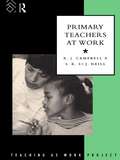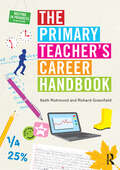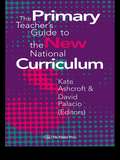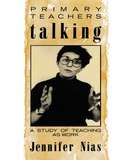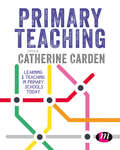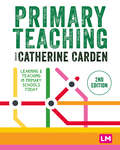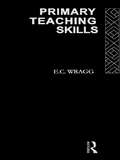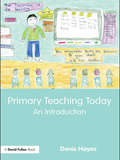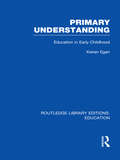- Table View
- List View
Primary Science for Trainee Teachers
by James Archer Ms Judith RodenWith chapter sequencing following the new Curriculum, this book supports trainee Primary school teachers to make use of the opportunities presented in the new National Curriculum for effective and engaging Science teaching. Covering all of the areas of the new National Curriculum for primary science and offering insight into effective teaching, it helps you connect what you need to teach to how it can be taught. This comprehensive guide to teaching Primary Science will help you secure your subject knowledge, understand how children learn about science and know how to plan and teach effective and inspiring science lessons. Exploring opportunities in the new curriculum for creative and imaginative teaching, it shows you how to capitalize on opportunities to teach Science in a way that sparks children's interest. Includes the full National Curriculum Programme of Study for Science, key stages 1 and 2 as a useful reference for trainee teachers.
Primary Science: Knowledge and Understanding (Achieving QTS Series)
by Graham A Peacock John Sharp Rob Johnsey Debbie WrightAll the subject knowledge you need to teach primary science. The essential subject knowledge text for primary science. Secure subject knowledge and understanding is the foundation of confident, creative and effective teaching. This comprehensive text, covering the whole primary curriculum, includes interactive tasks, self-assessment questions and links to other resources in all chapters. Primary science matters. This 10th edition includes links to the ITT Core Content Framework and new content on children’s common misconceptions in science.
Primary Science: Knowledge and Understanding (Achieving QTS Series)
by Graham A Peacock John Sharp Rob Johnsey Debbie WrightAll the subject knowledge you need to teach primary science. The essential subject knowledge text for primary science. Secure subject knowledge and understanding is the foundation of confident, creative and effective teaching. This comprehensive text, covering the whole primary curriculum, includes interactive tasks, self-assessment questions and links to other resources in all chapters. Primary science matters. This 10th edition includes links to the ITT Core Content Framework and new content on children’s common misconceptions in science.
Primary Science: Knowledge and Understanding (Achieving QTS Series)
by John Sharp Rob Johnsey Debbie Wright Keira Sewell Graham A PeacockAll the subject knowledge you need to teach primary science. If you are training to be a primary school teacher, you need to understand what you need to know about primary science before you can teach it. To help you build your subject knowledge, this comprehensive text includes subject knowledge from each part of the primary science curriculum and comes with a wide range of resources so you can test you knowledge as you progress through the course. an online science subject knowledge audit with the ability to share results end of chapter self-assessment questions Interactive tasks a science subject knowledge checklist useful weblinks for primary science teaching Recommended further reading This new edition comes with a new chapter on science in curriculum.
Primary Science: Knowledge and Understanding (Achieving QTS Series)
by John Sharp Rob Johnsey Debbie Wright Keira Sewell Graham A PeacockAll the subject knowledge you need to teach primary science. If you are training to be a primary school teacher, you need to understand what you need to know about primary science before you can teach it. To help you build your subject knowledge, this comprehensive text includes subject knowledge from each part of the primary science curriculum and comes with a wide range of resources so you can test you knowledge as you progress through the course. an online science subject knowledge audit with the ability to share results end of chapter self-assessment questions Interactive tasks a science subject knowledge checklist useful weblinks for primary science teaching Recommended further reading This new edition comes with a new chapter on science in curriculum.
Primary Science - Making It Work
by Chris Ollerenshaw Ron RitchieFirst Published in 1997. Routledge is an imprint of Taylor & Francis, an informa company.
Primary Science: Teaching Theory and Practice (Achieving QTS Series)
by John Sharp Graham A Peacock Rob Johnsey Shirley Simon Robin James Smith Alan Cross Diane HarrisAll you need to know about the theory and practice of teaching primary science. If you are training to be a primary school teacher, a knowledge of the primary science curriculum is not enough, you need to know HOW to teach science in primary schools. This is the essential teaching theory and practice text for primary science. It takes a focused look at the practical aspects of teaching and covers the important skills of classroom management, planning, monitoring and assessment, and relates them specifically to primary science. This new edition now includes a new chapter on creative curriculum approaches.
Primary Science: Teaching Theory and Practice (Achieving QTS Series)
by John Sharp Graham A Peacock Rob Johnsey Shirley Simon Robin James Smith Alan Cross Diane HarrisAll you need to know about the theory and practice of teaching primary science. If you are training to be a primary school teacher, a knowledge of the primary science curriculum is not enough, you need to know HOW to teach science in primary schools. This is the essential teaching theory and practice text for primary science. It takes a focused look at the practical aspects of teaching and covers the important skills of classroom management, planning, monitoring and assessment, and relates them specifically to primary science. This new edition now includes a new chapter on creative curriculum approaches.
Primary Science Teaching Theory and Practice
by John Sharp Graham Peacock Rob Johnsey Shirley Simon Robin Smith Alan Cross Diane HarrisThe 6th edition of this popular core text provides the essential teaching theory and practice for primary science. It promotes effective teaching through secure pedagogical knowledge, covering the key skills of planning, monitoring and assessment and class management, and relating these specifically to primary science. This 6th edition is linked to the 2012 Teachers' Standards. With full coverage of the theory and practice required for effective and creative science teaching, this text is an essential guide for all trainees working towards QTS. Throughout, practical guidance and features support trainees to translate this learning to the classroom, embed ICT in their lessons and to understand the wider context of their teaching. Trainees will find it helpful to use this book alongside Primary Science Knowledge and Understanding. About the Achieving QTS series All the books in this successful series support trainees through their initial teacher training and guide them in the acquistion of their subject knowledge, understanding and classroom practice. All new titles within the series link to the 2012 Teachers' Standards and take into account recent changes in Initial Teacher Training.
Primary Special Needs and the National Curriculum
by Ann LewisThis new edition of Ann Lewis's widely acclaimed text has been substantially revised and updated to take into account the recent revisions to the National Curriculum and the guidance of the Code of Practice. It provides: *an analysis of the issues and practicalities of implementing the National Curriculum at primary school level *an exploration of the main trends concerning the education of children with learning difficulties *guidelines on safeguarding a broad curriculum, assessing children's learning and helping all children gain access to the National Curriculum Related issues such as the grouping of children, the role of the special needs coordinator, resources, record keeping and the legal position are also examined. These areas are explored in the light of classroom practice, evidence about the impact of the National Curriculum to date and wider research evidence and policy analysis.
Primary Special Needs and the National Curriculum
by Ann LewisThis new edition of Ann Lewis's widely acclaimed text has been substantially revised and updated to take into account the recent revisions to the National Curriculum and the guidance of the Code of Practice. It provides: *an analysis of the issues and practicalities of implementing the National Curriculum at primary school level *an exploration of the main trends concerning the education of children with learning difficulties *guidelines on safeguarding a broad curriculum, assessing children's learning and helping all children gain access to the National Curriculum Related issues such as the grouping of children, the role of the special needs coordinator, resources, record keeping and the legal position are also examined. These areas are explored in the light of classroom practice, evidence about the impact of the National Curriculum to date and wider research evidence and policy analysis.
The Primary STEM Ideas Book: Engaging Classroom Activities Combining Mathematics, Science and D&T
by Elizabeth Dr Flinn Anne MulliganThe Primary STEM Ideas Book is designed to promote the integrated teaching of STEM in the primary classroom by providing teachers with lesson ideas for investigations and projects. The statutory requirements of the National Curriculum for science, mathematics and design and technology are comprehensively covered through a variety of practical, stimulating and engaging activities, which have all been tried and tested in the primary classroom. The interrelationship between the STEM subjects is strongly integrated throughout, allowing children’s knowledge and skills to develop with confidence in these key subjects through activities which only require easily accessible resources generally found in the classroom. Written by subject specialists with years of classroom experience teaching STEM, each chapter contains: A rationale showing links to the National Curriculum Key subject knowledge Brief session plans Ideas for supporting higher and lower attaining children Follow up ideas to provide extra inspiration Including ‘how to’ guides and other photocopiable resources, this book is perfect for creating integrated lessons, group work and discussions relating to STEM. The Primary STEM Ideas Book provides easy to follow instructions and helps spark fresh inspiration for both new and experienced teachers in primary STEM education.
Primary Teacher Education: High Status? High Standards?
by Colin Richards Neil Simco Sam TwiseltonInformed professional debate about primary teacher education is long overdue. This book provides a sense of direction and impetus in this debate by focusing on pressing topical issues of policy and provision. There is focus on the current national scrutiny of initial and inservice teacher training, which is resulting in the development of a National Curriculum for ITE, the proposal of a General Teaching Council, and Continuing Professional Development initiatives from the TTA. In addition, the book will be of direct use in the design and implementation of new courses in teacher education. All the contributions have been specially commissioned for this book.
Primary Teacher Solutions: Ready Pedagogy and Inspirational Ideas
by Poppy Gibson Robert Morgan Ashley BrettThis timely book offers a raw critique of the current educational issues and debates, alongside ‘teacher hacks’ to provide teachers, trainee teachers and educators with a plethora of stimulating material to ignite curiosity, maintain passion and culture creativity in the classroom. Made in partnership with academics and primary school teachers working on the frontline from around the globe, this book is threaded with honest practitioner voices as the big educational issues are boiled down and explored. Chapters cover day-to-day organisation such as planning, subject knowledge, setting homework and behaviour management strategies, right through to considering how we can best support children’s mental health and staff well-being. As well as including critical questions to encourage reflection throughout, the book offers insights into meaningful experiences such as: Teaching overseas Taking on responsibility roles in schools Considering how teachers can become educational researchers for transformative change Engaging with parents and carers Deploying teaching assistants Whether trainee teachers, early career teachers or established practitioners, this book provides insight into trialled tips and techniques for shaping pedagogy in the classroom. A modern, well-resourced guide as we emerge from the global COVID-19 pandemic.
Primary Teachers at Work (The Teaching as Work Project)
by Jim Campbell S. R. NeillThe first part of this book charts and analyses the working days of 326 primary school teachers. It shows how they spent their working lives, the nature of the curriculum they taught, and analyses their work into five main categories: Teaching, Preparation, Administration, Professional Development and Other Activities. The second part comments on the findings by relating them to issues of school management and curriculum manageability and looks at how the idea of `conscientiousness' among primary school teachers may have lead to their exploitation.
The Primary Teacher's Career Handbook
by Keith Richmond Richard GreenfieldThe Primary Teacher’s Career Handbook is invaluable to all those in Primary education. This essential and unique handbook sets out a complete and much needed career development path for Primary School teachers from the stage of seeking a first appointment, through to middle-management, Headship and beyond. Throughout the book, teachers will be shown how to plan their career development by making their present role successful, enabling them to make a smooth progression to achieve their career aspirations. Offering realistic advice and including pragmatic solutions, which result from years of first-hand experience, the chapters explore key career stages such as: applying for your first teaching post; being successful in your induction year; managing a subject area; professional development and developing as a leader; preparing for Deputy Headship and achieving your first Headship role; building your CV and making an application; interviews; and working with colleagues, parents and governors. Written to support the work of all those in the field of Primary education, this book is not just essential reading for trainee and newly qualified teachers, but it is an invaluable resource for teachers at every stage of their careers.
The Primary Teacher's Guide To The New National Curriculum
by Kate Ashcroft David PalacioThis guide gives an overview of the curriculum arrangements which took effect in August 1995. The book outlines the main changes to the original National Curriculum and gives examples of ways to teach the new curriculum, together with enquiry tasks to take the teacher forward. It also covers each of the subjects of the revised National Curriculum, locating them within a context of whole curriculum planning. Looking at issues of differentiation, the book explores those additional elements of the curriculum, such as cross curricular themes and drama, that primary schools will wish to cover.
Primary Teachers Talking: A Study of Teaching As Work
by Professor Jennifer Nias Jennifer NiasFirst published in 2002. Routledge is an imprint of Taylor & Francis, an informa company.
Primary Teaching: Learning and teaching in primary schools today
by Catherine CardenWhen learning to teach, practical experience in the classroom is as essential as learning from others and being able to reflect on your own learning and performance. Equally important is the ability to critically evaluate learning and teaching. This new, extensive, core text from Learning Matters tackles questions like: What drives schools and what challenges them? What can we learn from other countries? Does curriculum really matter? How do teachers manage behaviour? How do I prove that my children are learning? What does mastery really look like? Discussing these and many more, it comprehensively covers professional studies modules and goes beyond to support trainees on placements and in their learning on the course. Learning features throughout have been designed to help students develop their understanding, broaden their perspectives, think more critically and apply theory to practice. These include: Case Studies to apply learning to real-life school contexts. Key Readings to encourage wider reading, broaden perspectives and offer practical ideas for the classroom. Key Theory features introduce and summarise big ideas, theories and research. Critical Questions direct reflection, help students engage with what their reading and encourage critical responses. Classroom Links highlight good practice, provide practical ideas and show how to implement these in the classroom. Assignment features offer helpful points to consider and practical advice for writing assignments on chapter topics, which act as great starting points.
Primary Teaching: Learning and teaching in primary schools today
by Catherine CardenWhen learning to teach, practical experience in the classroom is as essential as learning from others and being able to reflect on your own learning and performance. Equally important is the ability to critically evaluate learning and teaching. This new, extensive, core text from Learning Matters tackles questions like: What drives schools and what challenges them? What can we learn from other countries? Does curriculum really matter? How do teachers manage behaviour? How do I prove that my children are learning? What does mastery really look like? Discussing these and many more, it comprehensively covers professional studies modules and goes beyond to support trainees on placements and in their learning on the course. Learning features throughout have been designed to help students develop their understanding, broaden their perspectives, think more critically and apply theory to practice. These include: Case Studies to apply learning to real-life school contexts. Key Readings to encourage wider reading, broaden perspectives and offer practical ideas for the classroom. Key Theory features introduce and summarise big ideas, theories and research. Critical Questions direct reflection, help students engage with what their reading and encourage critical responses. Classroom Links highlight good practice, provide practical ideas and show how to implement these in the classroom. Assignment features offer helpful points to consider and practical advice for writing assignments on chapter topics, which act as great starting points.
Primary Teaching: Learning and teaching in primary schools today (Primary Teaching Now)
by Catherine CardenThe second edition of this core text from Learning Matters asks: What is teaching? Does curriculum really matter? Does behaviour need ′managing′? What is a learning environment today? Does my classroom reflect the identities of all of my learners? How can I bring the theme of sustainability to my teaching? Discussing these and many more, it covers the contents of professional studies modules and goes beyond to support trainees on placements and in their learning on the course. Five new chapters are added for this edition discussing themes of sustainability, teacher self care, diversity in the curriculum, sex and relationships education and our new understanding of learning environments. Learning features throughout have been designed to help students develop their understanding, broaden their perspectives, think more critically and apply theory to practice. These include: Case Studies to apply learning to real-life school contexts. Key Readings to encourage wider reading, broaden perspectives and offer practical ideas for the classroom. Key Theory features introduce and summarise big ideas, theories and research. Critical Questions direct reflection, help students engage with what their reading and encourage critical responses. Classroom Links highlight good practice, provide practical ideas and show how to implement these in the classroom. Assignment features offer helpful points to consider and practical advice for writing assignments on chapter topics, which act as great starting points.
Primary Teaching: Learning and teaching in primary schools today (Primary Teaching Now)
by Catherine CardenThe second edition of this core text from Learning Matters asks: What is teaching? Does curriculum really matter? Does behaviour need ′managing′? What is a learning environment today? Does my classroom reflect the identities of all of my learners? How can I bring the theme of sustainability to my teaching? Discussing these and many more, it covers the contents of professional studies modules and goes beyond to support trainees on placements and in their learning on the course. Five new chapters are added for this edition discussing themes of sustainability, teacher self care, diversity in the curriculum, sex and relationships education and our new understanding of learning environments. Learning features throughout have been designed to help students develop their understanding, broaden their perspectives, think more critically and apply theory to practice. These include: Case Studies to apply learning to real-life school contexts. Key Readings to encourage wider reading, broaden perspectives and offer practical ideas for the classroom. Key Theory features introduce and summarise big ideas, theories and research. Critical Questions direct reflection, help students engage with what their reading and encourage critical responses. Classroom Links highlight good practice, provide practical ideas and show how to implement these in the classroom. Assignment features offer helpful points to consider and practical advice for writing assignments on chapter topics, which act as great starting points.
Primary Teaching Skills
by Prof E Wragg E. C. WraggPrimary teachers have always been required to master a wealth of knowledge and professional skills and recent debate has led to pressure for ever higher levels of competence. Ted Wragg's book provides a comprehensive guide to the skills needed by today's primary teachers. Separate chapters cover such central demands of the job as explaining new topics, asking stimulating questions and settling down with a new class and one is devoted to the particular problems of supply teachers. Based on extensive research in classrooms over the last three years, Primary Teaching Skills will enlighten and entertain both student and novice teachers and their more experienced colleagues at all stages of their professional development.
Primary Teaching Today: An Introduction
by Denis HayesPrimary Teaching Today takes the reader ‘behind the scenes’ and alerts them to the fundamental attitudes and practices that every new primary teacher must acquire to make a success of their work and, crucially, to get maximum enjoyment while doing so. With a friendly narrative style and refreshing candour, the book focuses as much on what primary teachers should aspire to be as it does on what teachers are meant to do. Thus, the early chapters orientate towards the attributes for which teachers should persevere; the later chapters are more heavily weighted towards the implications for classroom practice and work in school. The final chapter offers a variety of exercises and tasks to deepen thinking and enhance professional learning, linked to the QTS Standards. Throughout the book there are ‘Extend your thinking’ prompts containing statements and questions to stimulate the reader in facing challenging issues, a ‘Terminology check’ to clarify meanings of terms, plus ‘Strengthening practice’ boxes with practical suggestions about implementation. The book is also unusual in that it provides relevant information about key issues under ‘Professional learning perspectives’ at the end of each chapter.
Primary Understanding: Education in Early Childhood (Routledge Library Editions: Education)
by Kieran EganBeginning with descriptions of the ways in which children make sense of their experience and the world, such as fantasy, stories and games, Egan constructs his argument that constituting this foundational layer are sets of cultural sense-making capacities, reflected in oral cultures throughout the world. Egan sees education as the acquisition of these sets of sense-making capacities, available in our culture, and his goal is to conceptualize primary education in a way that over comes the dichotomy between progressivisim and traditionalism, attending both the needs of the individual child and the accumulation of knowledge.
